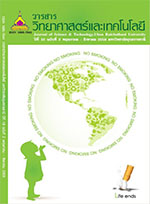สถานการณ์การสูบบุหรี่ของบุคลากรและนักศึกษามหาวิทยาลัยอุบลราชธานี : ภายใต้โครงการมหาวิทยาลัยอุบลราชธานีปลอดบุหรี่
Main Article Content
บทคัดย่อ
การสูบบุหรี่ทำให้เกิดผลกระทบต่อร่างกาย จิตใจ เศรษฐกิจ และสังคมมากมาย โดยผู้ป่วยด้วยโรคที่มีสาเหตุจากการสูบบุหรี่มีถึงปีละ 5 ล้านคน มหาวิทยาลัยและสถาบันการศึกษามีหน้าที่รับผิดชอบต่อบุคลากรและนักศึกษาในการป้องกันให้ปลอดภัยจากอันตรายของบุหรี่ และสร้างสิ่งแวดล้อมเพื่อเป็นแบบอย่างที่ดีด้านสุขภาพต่อสังคม การศึกษาครั้งนี้มีวัตถุประสงค์เพื่อศึกษาความชุกของการสูบบุหรี่ ปัจจัยที่มีความสัมพันธ์กับการสูบบุหรี่ และแนวทางการดำเนินงานมหาวิทยาลัยอุบลราชธานีปลอดบุหรี่ กลุ่มตัวอย่าง คือ บุคลากรและนักศึกษามหาวิทยาลัยอุบลราชธานีจำนวน 550 คน เก็บรวบรวมข้อมูลโดยใช้แบบสอบถาม วิเคราะห์ข้อมูลด้วยสถิติพรรณนา แจกแจงความถี่ ร้อยละ ค่าเฉลี่ย ส่วนเบี่ยงเบนมาตรฐาน และ Chi – Square test ผลการศึกษา พบว่า บุคลากรสูบบุหรี่ร้อยละ 26.0 (95% CI =19.1-33.7) สูบบุหรี่ครั้งแรกอายุเฉลี่ย 18.9 ปี สูบบุหรี่เฉลี่ยวันละ 8 มวน เมื่อทดสอบหาความสัมพันธ์กับการสูบบุหรี่ พบว่า เพศ สายงานที่ปฏิบัติ ทัศนคติเกี่ยวกับโทษของสูบบุหรี่ และบุคคลในครอบครัวที่สูบบุหรี่ มีความสัมพันธ์กับการสูบบุหรี่อย่างมีนัยสาคัญทางสถิติ (P< 0.001, P=0.032, P<0.001, P<0.001) ตามลำดับ ส่วนนักศึกษาสูบบุหรี่ร้อยละ 11.5 (95% CI =8.5-15.0) สูบบุหรี่ครั้งแรกอายุเฉลี่ย 16.6 ปี สูบบุหรี่เฉลี่ยวันละ 7 มวน เมื่อทดสอบหาความสัมพันธ์กับการสูบบุหรี่ พบว่า เพศ อายุ ทัศนคติเกี่ยวกับโทษของสูบบุหรี่ และบุคคลในครอบครัวที่สูบบุหรี่ มีความสัมพันธ์กับการสูบบุหรี่อย่างมีนัยสำคัญทางสถิติ (P< 0.001, P=0.039, P<0.001, P<0.001) ตามลำดับบุคลากรและนักศึกษาร้อยละ 92.5 เห็นด้วยกับการดำเนินงานมหาวิทยาลัยอุบลราชธานีปลอดบุหรี่ โดยร้อยละ 85.8 ต้องการให้จัดเขตพื้นที่สูบบุหรี่โดยเฉพาะ ร้อยละ 84.5 ต้องการให้จัดกิจกรรมรณรงค์เพื่อการไม่สูบบุหรี่อย่างต่อเนื่องในทุกช่องทาง และร้อยละ 81.3 ต้องการให้จัดกิจกรรมช่วยเลิกสูบบุหรี่ ผลการศึกษา สามารถนำไปใช้ในการวางแผนเพื่อดำเนินงานให้สอดคล้องกับความต้องการ เพื่อแก้ไขปัญหาการสูบบุหรี่ของบุคลากรและนักศึกษา ซึ่งจะนำไปสู่ความสำเร็จในการดำเนินงานมหาวิทยาลัยปลอดบุหรี่ โดยต้องมีนโยบายที่ชัดเจนและอาศัยความร่วมมือจากทุกภาคีเครือข่ายทั้งภายใน ภายนอก มหาวิทยาลัย โดยเฉพาะบุคลากรทางการแพทย์และสาธารณสุข ถือเป็นผู้ที่มีบทบาทสาคัญในการที่จะผลักดันให้มหาวิทยาลัยอุบลราชธานีเป็นมหาวิทยาลัยปลอดบุหรี่อย่างจริงจังและยั่งยืนต่อไป
The situation of Smoking Behavior among Staff and Students at Ubon Ratchathani University: Smoke Free Ubon Ratchathani University Project
Smoking has an impact on physical, mental, financial and social. There are approximately 5 million people each year suffer from consequences of smoking. Educational institutions need to take responsibility to protect students and staff from the hazards of smoking as well as create environmental model for healthy societies. This study aimed to examine the prevalence of smoking, factors associated with smoking, and guidelines for being a smoke-free university. The study involved 550 staffs and students at Ubon Ratchathani University. Data were collected using questionnaires and analyzed by descriptive statistics, frequencies, percentages, averages, standard deviations and chi-squared test. Results showed that staffs smoked 26.0% (95% CI= 19.1-33.7). The average age of first time smoking was 18.9 years and they smoked an average of 8 cigarettes per day. Gender, field of work, attitudes towards smoking, and having family members who smoked were found to be statistically significant in relation to smoking behavior (P <0.001, P = 0.032, P <0.001, and P <0.001 respectively). The study found that students smoked 11.5 % (95% CI = 8.5-15.0). The average age of first time smoking was 16.6 years and they smoked an average of 7 cigarettes per day. Gender, age, attitudes towards smoking, and having family members who smoked were statistically significant in relation to smoking behavior (P <0.001, P = 0.039, P <0.001, and P <0.001 respectively). The staffs and students approved about the university being a smoke-free place at 92.5%, 85.8% wanted to dedicate smoking areas, 84.5% wanted to continue campaigns to quit smoking, and 81.3% wanted to have activities to help people quit smoking. These results can be used to solve smoking problems of the university staffs and students and may lead to successful implementation of a smoke-free university through apparent policy and the co-operation from internal and external authorities. Implementation is especially important in the role of medical and public health staffs in the creation of a sustainable smoke-free university.
Article Details
บทความที่ได้รับการตีพิมพ์เป็นลิขสิทธิ์ของ วารสารวิทยาศาสตร์และเทคโนโลยี มหาวิทยาลัยอุบลราชธานี
ข้อความที่ปรากฏในบทความแต่ละเรื่องในวารสารวิชาการเล่มนี้เป็นความคิดเห็นส่วนตัวของผู้เขียนแต่ละท่านไม่เกี่ยวข้องกับมหาวิทยาลัยอุบลราชธานี และคณาจารย์ท่านอื่นๆในมหาวิทยาลัยฯ แต่อย่างใด ความรับผิดชอบองค์ประกอบทั้งหมดของบทความแต่ละเรื่องเป็นของผู้เขียนแต่ละท่าน หากมีความผิดพลาดใดๆ ผู้เขียนแต่ละท่านจะรับผิดชอบบทความของตนเองแต่ผู้เดียว


